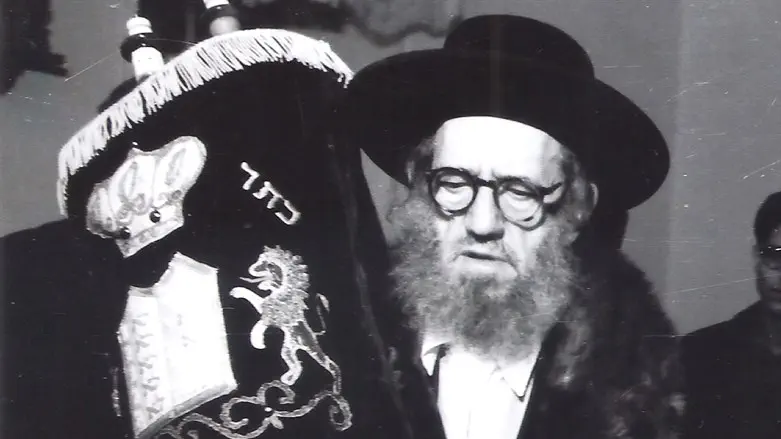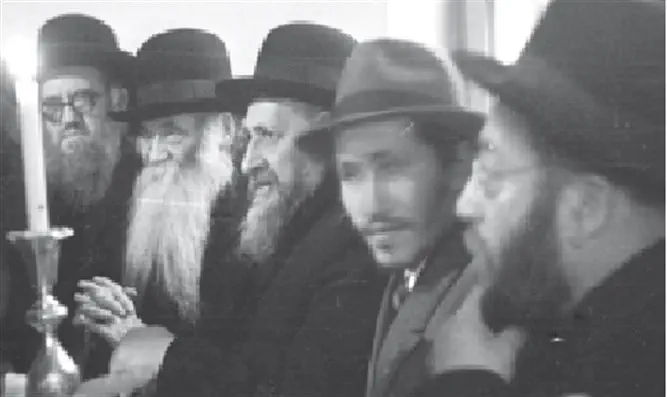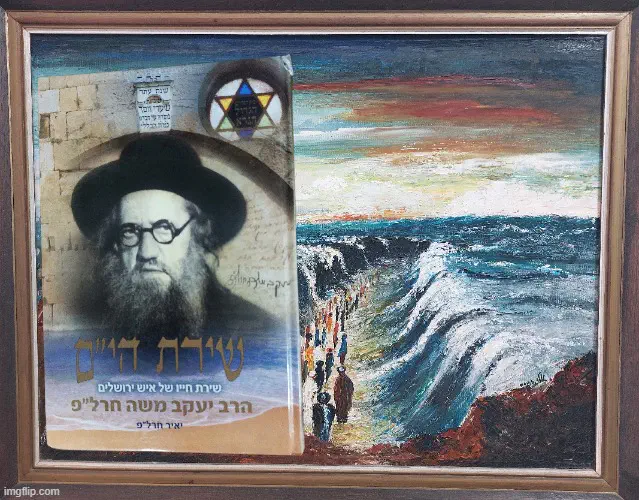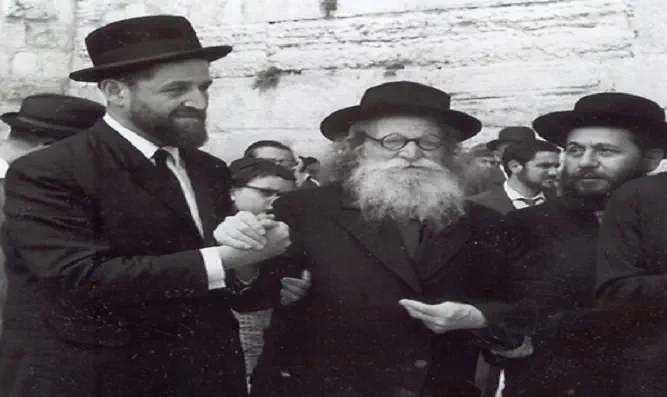
In Jerusalem, on the Seventh Night of Pesach, as midnight approaches, a mixture of Jerusalemites including Rabbis with white beards, young yeshiva students, and secular-looking types can be seen walking briskly toward the small shul of HaRav Moshe Yaacov Charlap, of blessed memory, in the old Sha’are Chesed neighborhood of the Holy City.
There they gather to chant a special rendering of “Shirat HaYam” whose melody was composed by Rabbi Charlap, singing the verses which Moshe Rabbenu and Bnei Yisrael triumphantly sang after crossing the Red Sea on Pesach Night, as set forth in the Torah. In other neighborhoods throughout Jerusalem, and in other cities and settlements as well, worshippers will congregate together to chant, verse after verse, the exalted song and its heart-stirring tune.
Rabbi Moshe Yaakov Charlap was born in Jerusalem in 1882. His father served as a rabbinic judge in the Beit Din of the Torah Authority Rabbi Yehoshua Leib Diskin. Shortly after Rabbi Kook arrived in Israel in 1904, the two developed a close relationship, becoming intimate friends and study partners. In books and lectures, Rabbi Charlap expounded on the philosophy of Rabbi Kook, who he considered his mentor.

Photo: The wedding of the Brisker Rebbe's son; l. to r. Rav Charlap, Rav Isser Zalman Meltzer, the Brisker Rav, the groom.
Rabbi Charlap was also known for his extensive knowledge of Kabbalah. When the Sha’are Hesed neighborhood of Jerusalem was established outside the Old City in 1908, Rabbi Harlap was appointed Rabbi of the neighborhood. In 1924, when Rabbi Kook established the Mercaz HaRav Yeshiva, Rabbi Harlap was appointed Rosh Yeshiva, a position he held until his death in 1951. Rabbi Kook’s son, HaRav Tzvi Yehuda, continued to lead the yeshiva.
Like Rabbi Kook, Rabbi Charlap described the Exodus as the “springtime of history” which established Hashem as the one-and-only King. The journey through the Red Sea was the rite of passage for the newly-formed nation whose mission would be to bring the word of Hashem to the world.

That night of Redemption marked the beginning of an ongoing, historical process spanning generations which would unfold in a natural manner, including wars and international agreements, leading to the final establishment of the sovereign Nation of Israel in its unique Holy Land. This, he taught, was theme of the triumphant “Shirat HaYam” whose culmination envisioned the Kingdom of Hashem firmly ensconced in Eretz Yisrael, the palace of the King.

Photo: Harav Hanazir at the Kotel.
The holy Nazir, Rabbi David Kohen, one of the leading spiritual personalities of Jerusalem in that era, said, “The foundation of Rabbi Charlap’s soul is attached to the sea, for behold, the first initials of his name Yaakov Moshe spell out ‘yam’” - meaning sea.
Rabbi Charlap wrote that “The Seventh Day of Pesach is the day marked for salvation, for the attainment of prophecy and divine inspiration, enabling us to see what Ezekiel envisioned of the Divine Chariot.”
Like Rabbi Kook, his friend and mentor, Rabbi Charlap stressed the absolute importance of Eretz Yisrael to the Israelite Nation and to Torah. Here are a few of his teachings:
“The return of Am Yisrael to its Holy Land is the beginning of its Salvation and the beginning of its T’shuva for the transgressions which led to Galut.
“All Jews who are scattered in the lands of the goyim, as long as they have breath within them, they must make every effort they can to bring their talents and possessions to Israel.
“We have been taught that if someone says that all of the Torah comes from Hashem except for one letter, it is like he disavows the Creator. Similarly, if someone says that all of Israel belongs to the Jews except for one small parcel, behold he disconnects himself from the holiness of the Land and buries his soul. What permission does anyone have to carve Eretz Yisrael into pieces and thus raise his hand against the sanctuary of Hashem, to denigrate a portion of G-d’s gift which was given to us as an inheritance, an inheritance for all eternity?
“If we be forced, Heaven forbid, to place our signature on any type of document relinquishing parts of Eretz Yisrael and our exclusive possession of it, it would be wiser for those signing to cut off the thumbs of their hands and not to sever the planting of Hashem’s garden on Earth.
“We have known from time immemorial that without Eretz Yisrael we have nothing, neither in the realm of holiness or the profane. For this reason we have sacrificed ourselves greatly to return to Eretz Yisrael. Even when it was a place of desolation, swamps, and diseases, we came and saw it turn into a garden blessed by Hashem. Always we raised up in our hands the flag of the Nation. We fought against the abandonment of Torah and we will not give up the fight for the Land. We won battles and we will win more and the Holy Land will continue to develop in her holy beauty and purity.
“The Kedusha of Eretz Yisrael is an inner, independent holiness. Because of this there are special mitzvot which are dependent on the Holy Land and can only be performed there. It is not the case that the holiness of Eretz Yisrael depends on these mitzvot. Rather, it is because of the holiness of the Land that these mitzvot were commanded to be performed there.
“If the Jews who live outside of the Land recognized the pleasant holy air of Eretz Yisrael they would give up all of their possessions and businesses and make Aliyah with a spirit of miserut nefesh (self-sacrifice).
“In every era of history there is a special matter (nekuda) through which all goodness is illuminated and through which all of the adherence to Torah and mitzvot in that era depend. The nations intuitively know that if they are able to prevent the activation of this point, they will prevent the influence of holiness and Divine light from appearing in the world… And in the time of the “Footsteps of Mashiach” the principle point is Eretz Yisrael from whence all blessing emanates, and the Gentiles know that by preventing the Jewish People from gathering there, no influence of the holy will find concrete worldly expression . Thus, it should not be a wonder if all of the nations seek to interfere with the return of the Jewish People to the Holy Land and its settlement therein. Their greatest opposition is mainly focused on this precise point.
“Through the power of prayer we are able to continue to benefit from the air of Eretz Yisrael even when outside of the Land. If the Sages of the Great Assembly had not formulated our prayers it would have been impossible for the Jewish People to survive in Chutz L’Aretz, for without the air of Eretz Ysrael a Jew cannot exist. Since they lack the holy vitality of the air of Eretz Yisrael, they have no nourishment for their souls outside of the Land. If they would not come to the Land of Israel they are apt to totally assimilate amongst the nations, Heaven forbid.
“If I had to name the worst disaster that could befall me it would be to leave the Land of Israel for Chutz L’Aretz.
“In the future, when people understand the exalted value of the Land of Israel, only then will we comprehend how worthwhile was all the tribulation we suffered in Exile in order to merit our return.”